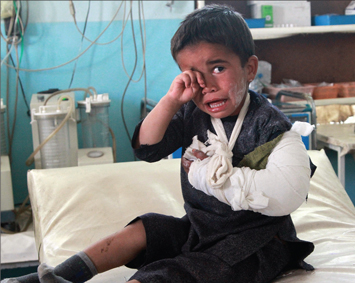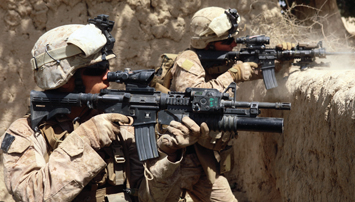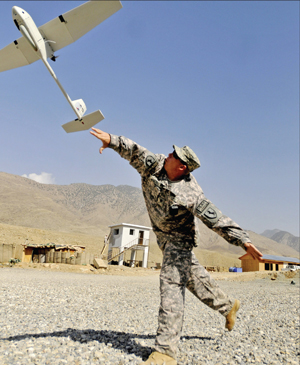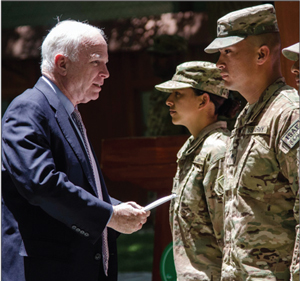Afghanistan and America's never-ending war
By Brian E. Muhammad -Contributing Writer- | Last updated: Jun 7, 2017 - 8:24:18 AMWhat's your opinion on this article?

(L) In this image taken TV shows two seriously injured children after a suicide attack in Baghlan province, north of Kabul, Afghanistan on Nov. 6, 2007. A bomb attack targeted a group of lawmakers in northern Afghanistan killing at least 28 people. (R) Spc. Hilda Clayton, a visual information specialist was attached to the 4th Armoured Brigade Combat Team, 1st Cavalry Division on maneuvres in Afghanistan in July 2013.
|
The UN Security Council and UN Secretary-General Antonio Guterres are strongly condemning the “terrorist attack” in Kabul and demanding that those responsible be brought to justice.

|
The council called it a “heinous and cowardly” attack and reaffirmed “that terrorism in all its forms and manifestations constitutes one of the most serious threats to international peace and security.”
The UN’s most powerful body urged all countries to cooperate with the Afghan government in identifying and prosecuting the perpetrators.
Secretary-General Guterres’ spokesman Stephane Dujarric said the secretary-general “expressed his abhorrence at this act and underlined the need to reinforce the fight against terrorism and violent extremism.”
The attack showed a major crack in security for the fortified “green zone” district where the Presidential Palace and many embassies are located. Officials described the blast as one of the deadliest in recent times. But, this is one of many incidents that have become common in Afghanistan.
“This horrific bombing in Kabul causes us to reconsider American foreign policy and being in Afghanistan for 16 years,” said Abdul Akbar Muhammad, international representative for the Nation of Islam. “It’s about the flawed policies of the West as it pertains to Iraq and Afghanistan in particular.”
Amnesty International called for an immediate and impartial investigation into the attack. “Today’s tragedy shows that the conflict in Afghanistan is not winding down but dangerously widening, in a way that should alarm the international community,” said the rights group in a statement.
Analysts told The Final Call that the violence is part of recurrent mayhem.
The war-torn nation of 29 million people has been enveloped in bloodshed, warfare and insecurity since the U.S. and its allies invaded it in 2001 as part of Washington’s war on terrorism, say geopolitical observers.

(R) U.S. Special Forces Soldier and an Afghan Commando scan the area for enemy movement after
taking direct enemy fi re, during an operation in the Khogyani district, Nangahar province, Afghanistan. (L) U. S. Army UH-60L Black Hawk helicopter flies over the Nangarhar Province of Afghanistan.
|
Sixteen years later, why is America still there?
Brian Becker, national coordinator for the ANSWER Coalition anti-war group, said the U.S. is maintaining a footprint in Afghanistan to save face militarily and for geopolitical reasons.
“Trump like Obama is trying to avoid the perception of defeat,” Mr. Becker explained. “The second reason is maybe more fundamental.”

An injured boy sits on a bed following an attack, at a hospital in Ghazni city, Afghanistan, May 12, 2014. The attacks happened on the outskirts of the city, said deputy provincial governor, Mohammad Ali Ahmadi. Two women and a policeman were killed, while two policemen and six civilians, including three children, were wounded, added Ahmadi. Photo: AP/Wide World photos
|
The landlocked country borders Iran, Pakistan and several southern republics of the former Soviet Union—now present-day Russia. Natural gas and oil pipelines runs through the area which America wants access to.
“America is staying in Afghanistan because they’re competing with China; they want to make sure that India and Pakistan stay—in one way or another—within their orbit. They don’t want Iran to become too powerful and they want to be able to access those natural resources,” said Mr. Becker.
The escalation of war in Afghanistan involves various actors vying for supremacy on the ground including the Taliban forces, Islamic State (ISIS), the United States and its NATO allies, said experts.
Just in the span of February 2016 to May 2017 there were more than 20 major bombings that claimed hundreds of lives in the Afghan capital Kabul alone, said reports.
In April, the U.S. military dropped a GBU-43/B Massive Ordnance Air Blast Bomb (MOAB), also called the “Mother Of All Bombs,” targeting ISIS forces. The MOAB is a 30-foot long, 21,600 pound, GPS-guided munition that is the largest non-nuclear weapon America possesses.
The Taliban resets itself

U. S. Marine Corps Sgt. Ryan Pettit, left, and Cpl. Matthew Miller, both with 2nd Battalion, 8th Marine Regiment (Reinforced), fire their service rifles during an operation in the Helmand province of Afghanistan July 3, 2009. The Marines, who are part of a ground combat element of Regiment Combat Team 3, 2nd Marine Expeditionary Brigade, are deployed to the area to prevent insurgent activities. Photo: Department of Defense
|
The Taliban controls roughly one-third of Afghanistan—more than at any time since 2001, when the war began. But, the Taliban and the other armed groups are not strong enough to completely evict the Americans and the Americans have developed a military strategy that allows the battle to persist with minimal American casualties, added Mr. Becker.
Although the U.S. has been at war in Afghanistan for so long, because of U.S. public perception, the war strategy “mitigates against anti-war opposition at home.”
Mr. Becker said the Pentagon is politically tolerating the loss. America knows it can’t win, but also can’t be fully defeated either by remaining engaged. However, it keeps up the pretext needed to maintain military bases in a very strategic part of the world.
U.S. must decide on policy
Earlier this year, America’s top commander in Afghanistan, General John Nicholson told the Senate Armed Forces Committee, he needed 5,000 more troops to help Afghan forces overcome the Taliban.

Army Spc. Mitchell Matney launches a Raven unmanned aerial vehicle at Combat Outpost Nagil in Afghanistan’s Laghman province, Oct. 13, 2009. Photo: U.S. Army photo/Spc. Derek L. Kuhn
|
“Are we winning or losing?” asked Sen. John McCain (R-Ariz.) of the general, who was appointed by former President Obama to the country in 2016.
“Mr. Chairman I believe we are in a stalemate,” General Nicholson responded.
Lawmakers are pressing the Trump administration to answer how strategic and operational changes in Afghanistan will achieve what hasn’t been accomplished in 16 years.
In a May 12 letter to the president, Senator Mike Lee (R-Utah) raised the issue that after expending “approximately $70 billion” of American tax dollars on the conflict, the U.S. has nothing to show it’s winning.
From 2006 to 2014 the United States had over 20,000 troops deployed to Afghanistan at any given time. Between 2010 and 2011 there were upwards of 100,000 military personnel in the country, he stated in the letter.
“However, these levels of military activity did not yield the long-term stability or security gains that were desired,” wrote Sen. Lee.
Former President Obama signed off on a massive withdrawal of troop numbers. Now there is an estimated 8,400 American troops in Afghanistan involved in training, advising and assisting Afghan security forces and conducting counterterrorism operations.
Minister Louis Farrakhan, National Representative of the Honorable Elijah Muhammad has repeatedly warned and cautioned America on the ensuing results from her propensity to interfere in the affairs of countries in the Middle East and Africa. America’s errant foreign policy and its agenda for that part of the world has a lot to do with vast mineral resources such as oil, the Nation of Islam minister has noted.
The government of America, and its leadership, is taking America and the world on a very dangerous course, warned the Muslim leader.
His teacher, Elijah Muhammad wrote in his book The Fall of America that “America loves meddling into other people’s affairs. She just cannot stay out of other people’s business, whether they be a two-cents worth soap-box teacher or presidents and kings of countries.”
“America goes abroad and makes war against other people. Then she charges them with making war against her when she is the one who is guilty of the war-making.”
No foreseeable end to war
However, there is no end in sight for the U.S. presence.

U. S. Sen. John McCain speaks to a group of soldiers before re-enlisting them during an Independence Day celebration in Kabul, Afghanistan, July 4, 2013. Photo: Dept. of Defense
|
In the 16 years the U.S.-NATO alliance was present there were over 90,000 direct war-related deaths, which includes insurgents, Afghan civilians and government forces, said an article on veteranstoday.com.
War and bedlam has defined the Islamic Republic of Afghanistan for decades.
“Would it be better for the Americans and the allied forces to consider pulling out all together; I think if they were not present, the chaos and confusion would not be there,” said Akbar Muhammad.
All the drama stemming from U.S. foreign policy is happening when “the greatest nation in the last 6,000 years, is in a time of trouble like America has never experienced,” said Minister Farrakhan, who has consistently warned America concerning its fate.
America is an international meddler and the strongest military power on earth with a defense budget of $534.3 billion. But, it is destined not to win another war.
“The future does not look good for the United States of America,” Minister Farrakhan said in an interview with Iranian Journalist Nader Talebzadeh earlier this year.
“We are facing global war, the war that is called in the Bible, Armageddon, a war where every nation on this earth will be involved,” said the Minister.
“The Middle East is the trigger for that war and if we as Muslims lose control of this area and it becomes a cesspool of violence and hatred among us as Muslims, the trigger will cause war to break out all over the earth as you see it now in Syria, Libya, Iraq, Afghanistan, Yemen and Egypt.”
INSIDE STORIES AND REVIEWS
-
-
About Harriett ... and the Negro Hollywood Road Show
By Rabiah Muhammad, Guest Columnist » Full Story -
Skepticism greets Jay-Z, NFL talk of inspiring change
By Bryan 18X Crawford and Richard B. Muhammad The Final Call Newspaper @TheFinalCall » Full Story -
The painful problem of Black girls and suicide
By Charlene Muhammad -National Correspondent- » Full Story -
Exploitation of Innocence - Report: Perceptions, policies hurting Black girls
By Charlene Muhammad -National Correspondent- » Full Story -
Big Ballin: Big ideas fuel a father’s Big Baller Brand and brash business sense
By Bryan Crawford -Contributing Writer- » Full Story






 Click Here Stay Connected!
Click Here Stay Connected!








